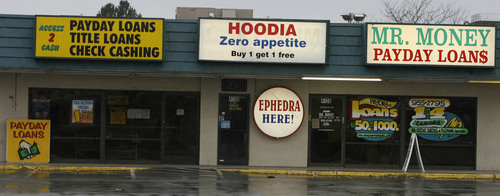This is an archived article that was published on sltrib.com in 2014, and information in the article may be outdated. It is provided only for personal research purposes and may not be reprinted.
The lawmaker who led the House investigation of former Attorney General John Swallow — and reported that payday lenders were involved in scandals that forced his resignation — is now pushing legislation to attack what critics have said are abuses by that industry.
"It's not trying to be vindictive," said Rep. Jim Dunnigan, R-Taylorsville, adding he has previously run bills regulating the industry. "I think it's the right policy." His proposal would give consumers tools "to get out of the cycle of debt" caused by such loans, he said.
State data show the loans now average 474 percent annual interest in Utah.
Dunnigan headed the House Special Investigative Committee that found in return for big donations from payday lenders, Swallow funneled money in hard-to-trace ways to help the industry defeat former Rep. Brad Daw, R-Orem, who sponsored bills to increase regulation.
The industry quietly gave Swallow huge donations he used to defeat his primary election opponent, Sean Reyes, who eventually replaced Swallow when the latter resigned.
When asked if attention on the industry from the scandal could help his bill, Dunnigan said, "It can't hurt."
Provisions in his HB127, introduced Thursday, include giving consumers extra time to pay off loans.
Under current law, the normal two-week loans can be extended or "rolled over" for up to 10 weeks. After 10 weeks, the lender can no longer charge more interest. But Dunnigan said lenders will often then take borrowers to court quickly for default, or submit checks they wrote as collateral "so people start accruing bounced check fees."
To avoid such problems, he said, many borrowers "will just go to a different payday lender to get another loan to pay off the first one." His bill would give them 60 days after reaching the 10-week limit before lenders could sue or submit the collateral checks. "It gives them a chance to get out of the cycle of debt."
The bill also would require lawsuits by payday lenders against borrowers to be filed either where the borrower lives or obtained the loan. Some lenders now require borrowers to waive that right before obtaining a loan to allow them to file suit where it is easier for the lender.
"So sometimes people who take out a loan in St. George are sued in Utah County," he said, making it more difficult to defend themselves. With the proposed change, "If you take out a loan in St. George, you go to court in St. George."
The bill also would require at least some checking by lenders to ensure borrowers can afford the loans and rollovers. That would include looking at some written proof of income, history of paying previous payday loans or credit checks.
"Little of that is done now in some instances," Dunnigan said.
It also would require payday lenders to disclose additional data to the state, including showing clearly how many loans reach and exceed the 10-week limit and the amounts of money involved.
Dunnigan said critics of the industry contend many people go the full 10 weeks and then take out more loans to pay off earlier ones, while the industry says most loans are paid off well before that. Additional data, the lawmaker said, could finally provide a clear answer.
Rep. Larry Wiley, D-West Valley City, is also running two payday-lender bills, similar to those that Daw unsuccessfully pushed earlier.
His HB46 also would require lawsuits by lenders against borrowers to be filed where the loans originated or the borrower lives. HB47 would ban borrowers from having more than two payday loans at a time; limit them to no more than 10 such loans in a year; and allow loans to total no more than 25 percent of their monthly take-home pay.



